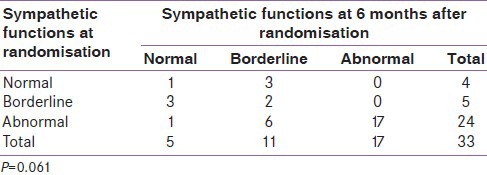Abstract
Background:
Yoga has been shown to be beneficial in diabetes in many studies, though randomized control trials are few. The aim of this randomized control trial was to see the effect of Sudarshan Kriya and related practices (comprehensive yogic breathing program) on quality of life, glycemic control, and cardiac autonomic functions in diabetes. Diabetes mellitus is a risk factor for sudden cardiac death. Cardiac autonomic neuropathy has been implicated in the causation of sudden cardiac death. Therefore, a maneuver to prevent progression of cardiac autonomic neuropathy holds significance.
Materials and Methods:
A total of 120 patients of diabetes on oral medication and diet and exercise advice were randomized into two groups: (1) Continued to receive standard treatment for diabetes. (2) Patients administered comprehensive yogic breathing program and monitored to regularly practice yoga in addition to standard treatment of diabetes. At 6 months, quality of life and postprandial plasma glucose significantly improved in the group practicing yoga compared to baseline, but there was no significant improvement in the fasting plasma glucose and glycated hemoglobin.
Results:
On per protocol analysis, sympathetic cardiac autonomic functions significantly improved from baseline in the group practicing comprehensive yogic breathing.
Conclusion:
This randomized control trial points towards the beneficial effect of yogic breathing program in preventing progression of cardiac neuropathy. This has important implications as cardiac autonomic neuropathy has been considered as one of the factors for sudden cardiac deaths.
Keywords: Comprehensive yogic breathing program, diabetes mellitus, cardiac autonomic function
BACKGROUND
Diabetes mellitus is a risk factor for sudden cardiac death. Cardiac autonomic neuropathy has been implicated in the causation of sudden cardiac death. Therefore a maneuver to prevent progression of cardiac autonomic neuropathy holds significance.
INTRODUCTION
We earlier published interim analysis[1,2] of a randomized control trial in diabetes showing improvement in quality of life,[1] post prandial plasma glucose and cardiac autonomic functions[2] with practice of comprehensive yogic breathing program. Here we describe the final findings on completion of the study.
MATERIALS AND METHODS
In this randomized controlled trial,120 patients of type 2 diabetes, controlled on stable dose of medication, glycemic control, quality of life and cardiac autonomic functions were assessed. Patients were then randomized into two: (1) receiving standard therapy (2) receiving comprehensive yogic breathing program with Sudarshan Kriya yoga plus standard therapy for diabetes.
Glycemic control, quality of life and cardiac autonomic function tests (CAFT) were repeated after 6 months of intervention and compared with those before randomisation.
MATERIALS AND METHODS
Analysis by Student's t-test, Wilcoxon-Mann-Whitney test, and exact test for two-way symmetry. Stata/IC 11.1 software was employed.
RESULTS
There was significant lowering of the postprandial but not the fasting plasma glucose and glycated hemoglobin in the SKY group compared to standard group [Table 1].
Table 1.
Change in parameters of glycemic control at 12 months as compared to at six months

Psychological (domain 1), environmental (domain 4), and total quality of life (WHO BREF QOL) improved significantly in the SKY compared to standard group [Table 2].
Table 2.
WHO BREF QOL mean scores at baseline and 3 and 6 months post randomisation

Total and parasympathetic cardiac autonomic functions did not show any significant difference in both groups.
On per protocol analysis, the sympathetic cardiac autonomic functions showed significant difference in the SKY to the standard group [Table 3].
Table 3.
Change in sympathetic functions in SKY Group at 6 months as compared to at randomization (per protocol analysis)

This change in sympathetic CAFT is not seen in the standard group [Table 4]. Neither of the groups showed any significant change in intention to treat analysis.
Table 4.
Change in sympathetic functions in standard Group at 6 months as compared to at randomisation

DISCUSSION
This study shows that practice of Comprehensive Yogic breathing program improves quality of life. In a chronic diseases like diabetes, quality of life is important as it effects the compliance.
It shows significant decrease in the post prandial plasma glucose and the decrease in progression of sympathetic CAFT in per protocol analysis. This means that if practiced regularly, comprehensive yogic positively effects CAFT.
Both derangement of post prandial plasma glucose[3] and cardiac autonomic neuropathy[4] have been implicated in sudden cardiac death in diabetes.
This study has follow up only for 6 months and shows significant effect on CAFT. Since the HbA1c did not change, this effect on CAFT is independent of the effect on glycemic control. It indicates that, if added to lifestyle, comprehensive yogic breathing program has potential of preventing sudden cardiac death.
Longer period follow up in larger number of patients is needed to assess effect on progress of CAFT and glycemic control. That such studies are feasible, has been shown earlier[5] and this area of research needs to be explored.
CONCLUSIONS
There is significant improvement in QOL, post prandial plasma glucose and sympathetic CAFT in patients practicing SKY.
ACKNOWLEDGMENT
We acknowledge funding from the Indian council of Medical Research.
Footnotes
Source of Support: Nil
Conflict of Interest: None declared
REFERENCES
- 1.Jyotsna VP, Joshi A, Ambekar S, Kumar N, Dhawan A, Sreenivas V. Comprehensive yogic breathing program improves quality of life in patients with diabetes. Indian J Endocrinol Metab. 2012;16:423–8. doi: 10.4103/2230-8210.95692. [DOI] [PMC free article] [PubMed] [Google Scholar]
- 2.Jyotsna VP, Ambekar S, Singla R, Joshi A, Dhawan A, Kumar N, et al. Cardiac autonomic function in patients with diabetes improves with practice of comprehensive yogic breathing program. Indian J Endocrinol Metab. 2013;17:480–5. doi: 10.4103/2230-8210.111645. [DOI] [PMC free article] [PubMed] [Google Scholar]
- 3.Gerich JE. Clinical significance, pathogenesis, and management of postprandial hyperglycemia. Arch Intern Med. 2003;163:1306–16. doi: 10.1001/archinte.163.11.1306. [DOI] [PubMed] [Google Scholar]
- 4.Pop-Busui R. What do we know and we do not know about cardiovascular autonomic neuropathy in diabetes. J Cardiovasc Transl Res. 2012;5:463–78. doi: 10.1007/s12265-012-9367-6. [DOI] [PMC free article] [PubMed] [Google Scholar]
- 5.Kjellgren A, Bood SA, Axelsson K, Norlander T, Saatcioglu F. Wellness through a comprehensive yogic breathing program-a controlled pilot trial. BMC Complement Altern Med. 2007;7:43. doi: 10.1186/1472-6882-7-43. [DOI] [PMC free article] [PubMed] [Google Scholar]


